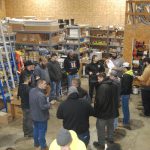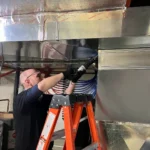Selecting the right furnace for your home is one of the most significant decisions you’ll make when considering heating solutions. Your furnace choice impacts not only the comfort of your home but also your energy costs and the longevity of your system. A properly chosen furnace ensures that your home remains warm, energy-efficient, and environmentally friendly, whereas an ill-suited one can lead to frequent breakdowns, uneven heating, and unnecessary energy waste. In this guide, we’ll explore the essential factors to consider when selecting a furnace and how to make the best decision for your home.
Understanding the Importance of the Right Furnace
The right furnace is more than just a piece of equipment; it is the key to maintaining both comfort and energy efficiency in your home. When chosen correctly, a furnace can provide reliable warmth without wasting energy or inflating utility bills. On the other hand, an inadequate furnace may leave some rooms colder than others, work harder than necessary, and eventually lead to costly repairs.
Comfort and Efficiency
A properly selected furnace provides consistent warmth throughout your home without straining itself or consuming excessive energy. Efficiency means more than simply using less fuel; it also means delivering warmth evenly and maintaining the desired temperature without fluctuations. Choosing a furnace that balances energy use with output ensures that your home is both comfortable and cost-effective.
Types of Furnaces
Choosing a furnace starts with understanding the various types available. Each type of furnace offers unique advantages depending on the fuel availability in your area, climate, and heating preferences.
Gas Furnaces
Gas furnaces are a top choice in many homes due to their ability to quickly heat spaces and their relatively low operating costs. They run on natural gas, which is generally more affordable than other fuel sources. Gas furnaces are known for their efficiency, especially in colder climates where heating demands are higher. These furnaces offer fast and effective heating solutions for homes that have access to natural gas.
Electric Furnaces
Electric furnaces use electricity to heat coils, which then warm the air that circulates throughout the home. They are a good option in regions where electricity rates are low or natural gas is not available. However, electric furnaces tend to be less efficient than gas furnaces, especially in very cold climates where they require more energy to heat a home. Electric furnaces are often more affordable to install upfront but may lead to higher energy bills over time in colder regions.
Oil Furnaces
Oil furnaces are common in regions where natural gas is not readily available. These furnaces are efficient and produce a significant amount of heat, making them suitable for colder climates. However, oil prices can fluctuate, which may result in unpredictable heating costs. Oil furnaces also require regular maintenance, such as refilling the oil tank, which can add to the overall cost of operation.
Propane Furnaces
Propane furnaces function similarly to gas furnaces but use propane as the fuel source. They are often found in rural areas where natural gas lines are unavailable. Propane is typically stored in tanks on the property and offers a reliable heating option for colder climates. While propane furnaces can be efficient, they require homeowners to manage the fuel supply, ensuring tanks are filled throughout the heating season.
Furnace Efficiency Ratings
When choosing a furnace, efficiency is a critical factor. A furnace’s efficiency is measured by its Annual Fuel Utilization Efficiency (AFUE) rating. This rating indicates how much of the fuel consumed by the furnace is converted into usable heat for your home.
Understanding AFUE Ratings
AFUE ratings range from 80% to 98%, with higher percentages representing greater efficiency. For example, a furnace with an AFUE rating of 90% converts 90% of its fuel into heat, with the remaining 10% lost during combustion. Energy-efficient furnaces with ratings above 90% are excellent investments for long-term savings. While these furnaces may have a higher upfront cost, the energy savings over time can more than compensate for the initial expense.
Energy Savings Over Time
Choosing a high-efficiency furnace is one of the smartest financial decisions you can make for your home. Although the cost of an energy-efficient furnace may be higher, the long-term savings in fuel costs can be substantial. Over the course of several years, an efficient furnace can lower your utility bills and provide reliable heating without wasting energy.
Determining the Proper Furnace Size
One of the most common mistakes homeowners make is selecting a furnace that is either too large or too small for their home. The size of your furnace plays a crucial role in both comfort and efficiency.
The Importance of Sizing
An undersized furnace will struggle to heat your home, running constantly to reach the desired temperature. This not only increases wear and tear on the furnace but also results in higher energy bills. On the other hand, an oversized furnace will cycle on and off frequently, causing uneven heating and inefficient operation.
Heat Load Calculation
A professional HVAC contractor can perform a heat load calculation to determine the correct furnace size for your home. This calculation takes into account factors such as the square footage of your home, the amount of insulation, the number of windows, and your local climate. By ensuring that your furnace is the correct size, you can avoid common problems such as uneven heating and wasted energy.
Climate Considerations
Your local climate plays a significant role in determining which furnace will best suit your home’s heating solutions.
Regional Climate Impact
In colder climates, a furnace with a high heat output and efficiency is essential to ensure consistent warmth. Homes in regions with freezing winters often require furnaces with higher AFUE ratings to keep heating costs manageable. In contrast, milder climates can typically use less powerful systems without sacrificing comfort.
Extreme Temperature Preparation
Considering how your furnace will perform in extreme temperatures is key to making the right choice. You’ll want a furnace that can handle the coldest days of the year without overworking itself or consuming excessive amounts of energy.
Fuel Source Availability
The availability of fuel sources in your area is another critical factor in choosing a furnace. Depending on where you live, natural gas, electricity, oil, or propane may be the most accessible and cost-effective option.
Access to Fuel
Natural gas is often the most affordable and widely available fuel source. However, if gas lines are not accessible, you may need to consider alternative fuel options such as electricity, oil, or propane. Each fuel source has its own set of advantages and disadvantages, so it’s important to research the cost and availability in your region.
Regional Energy Costs
The cost of fuel can vary significantly from one region to another. Understanding local energy costs will help you make a more informed decision about which furnace and fuel type to choose for your home’s heating solutions.
Budget and Long-Term Costs
While it’s tempting to focus solely on the upfront cost of a furnace, it’s important to consider the long-term costs as well.
Balancing Initial and Ongoing Costs
A high-efficiency furnace may have a higher purchase price, but the savings in energy costs over the lifetime of the furnace can make it a better investment. Additionally, high-efficiency models often qualify for rebates or tax incentives, which can help offset the initial cost.
Financially Sound Choices
When evaluating your budget, it’s essential to balance upfront costs with long-term savings. Investing in an energy-efficient furnace will not only provide immediate comfort but will also save you money on energy bills for years to come.
Compatibility with Existing HVAC Systems
Before choosing a furnace, it’s important to ensure that it will work seamlessly with your existing HVAC systems, including ductwork and ventilation.
Ensuring Seamless Integration
If your home’s current infrastructure is incompatible with the furnace you’re considering, you may need to invest in modifications. This could include upgrading ductwork or improving ventilation, which can add to the overall cost of the furnace installation.
Preventing Airflow Issues
Ensuring that your furnace integrates well with your home’s setup will prevent issues such as poor airflow, uneven heating, and system inefficiency.
Zoning Options for Customized Heating
For larger homes or homes with multiple levels, zoning offers a more efficient and customized approach to heating.
Efficient Home Heating
Zoning allows you to divide your home into different heating zones, each with its own thermostat. This means you can control the temperature in individual areas of your home, providing greater comfort and energy savings.
Customized Comfort
By heating only the areas you use and reducing energy use in unoccupied spaces, zoning offers a personalized and efficient heating solution for larger households.
Furnace Features and Technology
Modern furnaces come equipped with a variety of advanced features that enhance both efficiency and comfort.
Variable Speed Blowers
Furnaces with variable speed blowers adjust the speed of the fan motor based on your home’s heating needs. This allows for more even heating and greater energy efficiency compared to single-speed furnaces.
Modulating Furnaces
Modulating furnaces adjust the amount of heat produced to match the precise needs of your home. Rather than operating at full power, modulating furnaces run at varying levels, providing more consistent warmth while using less energy.
Noise Levels
Furnace noise can have a significant impact on the comfort of your home, particularly if the furnace is located near living spaces.
Consideration of Noise
Some furnaces are designed to operate more quietly, making them a better choice for homes where noise is a concern. Be sure to consider noise levels when selecting a furnace, especially if you prioritize a quiet home atmosphere.
Maintenance and Durability
The longevity of your furnace depends on its build quality and how well it’s maintained.
Regular Maintenance for Longevity
Some furnaces are built with durable materials that can extend their lifespan. Regular maintenance, such as changing filters and scheduling annual inspections, is also essential to keep your furnace running efficiently for many years.
Easy-to-Maintain Models
Choosing a furnace that requires minimal upkeep can save you time and money on repairs and maintenance over the years.
Warranty and Service
A furnace is a major investment, so it’s important to protect it with a comprehensive warranty.
Protecting Your Investment
Furnaces often come with warranties that cover parts and labor for a certain period. Be sure to review the warranty terms and choose a furnace from a reputable manufacturer that offers reliable service options.
Comprehensive Coverage
A strong warranty ensures that your furnace is protected against unexpected repairs and gives you peace of mind.
Environmental Impact
For homeowners concerned with sustainability, choosing an eco-friendly furnace is an excellent way to reduce your environmental footprint.
Choosing Eco-Friendly Models
High-efficiency furnaces use less fuel, which means they produce fewer emissions. Some models are also designed with environmentally friendly technologies that minimize greenhouse gas output.
Reducing Greenhouse Gases
Choosing an eco-friendly furnace allows you to enjoy a comfortable home while contributing to a cleaner environment.
Choosing a Professional Installer
Even the best furnace won’t perform well if it’s not installed properly.
Importance of Installation Quality
A professional, certified HVAC installer is essential to ensuring that your furnace operates safely and efficiently. Proper furnace installation ensures that your system will function as expected and provides a foundation for long-term performance.
Expert Guidance
A skilled installer will not only ensure proper installation but also provide guidance on maintenance and any future service needs.
Choosing the right furnace for your home is a decision that will affect both your comfort and your wallet for years to come. By understanding the various types of furnaces, evaluating your climate and fuel options, and considering factors such as efficiency, size, and features, you can make an informed choice that suits your household’s needs. A well-chosen furnace will provide consistent warmth, reduce energy costs, and ensure that your home remains a cozy haven during the coldest months.







